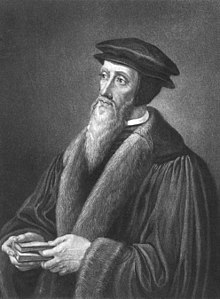Sir Walter Scott coined many phrases in his day. Related to religious reformer John Calvin,
according to Kenneth Stewart in “Ten Myths about Calvinism: Recovering the
Breadth of the Reformed Tradition”, usage of the term ‘Calvinistic’ comes
courtesy of Scott.
‘…The terms Calvinism and Calvinist have been in the
English language since the 1570’s, but their enduring and widespread usage has
reflected the embrace of a series of assumptions about Calvin and Geneva that
are, on examination, overplayed *
‘* The compact edition of the Oxford English Dictionary
of 1971 records an earliest usage of 1566 for the archaic form of Calvynian, of
1570 for Calvynisme, and of 1579 for Calvynyste; by contrast, the form
Calvinistic does not appear until Sir Walter Scott employed it in 1820….’
In “Woodstock”, Scott shows how members of the Protestant
clergy would sometimes dress like their Genevan counterparts, in honor of Calvin.
‘After
some time spent in waiting for him, Mr. Holdenough began to walk up the aisles
of the chapel, not with the slow and dignified carriage with which the old
Rector was of yore wont to maintain the dignity of the surplice, but with a
hasty step like one who arrives too late at an appointment, and bustles forward
to make the best use of his time. He was a tall thin man, with an adust complexion, and the vivacity of his
eye indicated some irascibility of temperament. His dress was brown, not black,
and over his other vestments he wore, in honour of Calvin,
a Geneva cloak of a blue colour, which fell backwards from his shoulders
as he posted on to the pulpit. His grizzled hair was cut as short as shears
could perform the feat, and covered with a black silk skull-cap, which stuck so
close to his head, that the two ears expanded from under it as if they had been
intended as handles by which to lift the whole person. Moreover, the worthy
divine wore spectacles, and a long grizzled peaked beard, and he carried in his
hand a small pocket-bible with silver clasps. Upon arriving at the pulpit, he
paused a moment to take breath, then began to ascend the steps by two at a
time.’
John Calvin was born on July 10, 1509.
